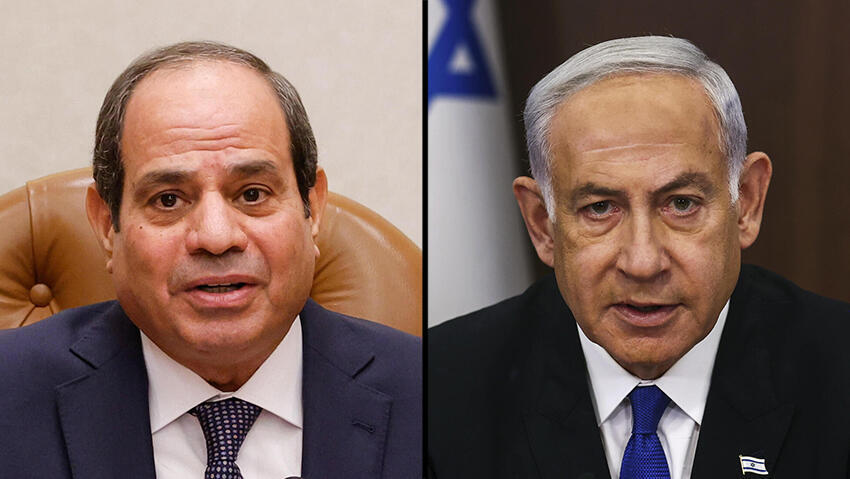In recent weeks, tensions have escalated between Israel and Egypt, adding another layer of complexity to the ongoing war in the region. Egyptian President Abdel Fattah el-Sisi has maintained a strategic silence. In contrast, his close ally, the director of the Egyptian General Intelligence Directorate, Abbas Kamel, has refrained from making any public statements. However, high-ranking military officials in Egypt, with the approval of the authorities, have openly expressed hatred toward Israel.
Read more:
This friction began with statements in Israel regarding the potential relocation of a million Gaza residents to the Sinai Peninsula. Sisi firmly opposed this idea and angrily declared that if Israel cared so much about the fate of Gaza residents, it should take them in and settle them in the Negev.
1 View gallery


Egyptian President Abdel Fattah el-Sisi and Prime Minister Benjamin Netanyahu
(Photo: EPA, AP)
The situation escalated further when Israel proposed settling a million Gaza residents in three cities along the Suez Canal as part of an initiative. Israel suggested seeking financial compensation from international bodies to help alleviate the severe economic crisis in Egypt, but Sisi emphatically rejected any possibility of this happening.
The tensions reached a climax last weekend when the Israeli team at the International Court of Justice in The Hague criticized Egypt for shirking its responsibility toward Gaza residents and accused Egypt of creating difficulties in the transfer of food and medicine. In response, the head of Egypt's National Information Authority, Diaa Rashwan, claimed that Israel had obstructed the passage of food trucks.
Dr. Abdel-Samad Jamaa, the leader of the Egyptian Wafd Party, also accused Israel of preventing the passage of food trucks. All Egyptian spokespersons emphasized that transferring medical aid and food products complies with international humanitarian assistance standards.
According to Egyptian military officials, Prime Minister Benjamin Netanyahu, in their view, is "playing games" by navigating between a complete ban and approval for a limited number of truck passages. The situation remains tense, with both sides exchanging accusations and the humanitarian situation for Gaza residents caught in the crossfire. The dynamics of this war continue to evolve, adding another layer of complexity to the already intricate geopolitical landscape in the Middle East.
The focus now is on the issue of control over the Philadelphi Corridor, stretching over 14 km from the Mediterranean Sea to beyond the Kerem Shalom crossing. Israel has stated that it has no interest in remaining in Gaza after the war and has dispatched a special envoy to Egypt, coordinating actions in the area with Major General Ghassan Alian, who will discuss the corridor's future with the head of Egyptian intelligence, Abbas Kamel. Israel aims to prevent the smuggling of weapons and military equipment through the underground tunnels beneath the corridor, while Egypt, aware of the problem, insists that they have destroyed hundreds of tunnels and sealed dozens more with seawater.
Egypt is concerned about clarifying that there will be no cooperation with the IDF. Israel persists in sending surveillance planes over the Philadelphi Corridor, citing the need for control, but Egypt remains adamant in refusing such actions, stating that it proves how sensitive both sides are, even though Israel and Egypt share the same concerns about Hamas.
Recent reports from Cairo suggest that, in parallel with Qatar, Egypt is working on another agreement for the release of Israeli hostages. There is no dispute that Qatar is successful with Hamas, and Israel prefers and relies on Egyptian mediation. However, Egypt, fearing economic damage and security threats on its territory, discreetly conveyed to Israel that an attack on the Philadelphi Corridor could jeopardize the peace agreement.
The corridor remains a troublesome and sensitive issue between the two countries, despite their agreements regarding the threat posed by Hamas. It is essential to remember that Egyptian prisons are full of members of the Muslim Brotherhood, the parent organization of the terror movement.
There is also no dispute that Egypt, no less than Israel, is greatly disturbed by the future of the movement and the security threats it generates. Israel is equally troubled by arms smuggling from the Egyptian side, coming from Sudan, Eritrea and ships sailing in the Mediterranean that stop briefly to unload cargoes off the coast of Sinai. As long as there is no complete control over the Philadelphi Corridor, the smuggling will continue. And as long as a high-profile security figure is not sent to Cairo, the situation may become more complicated.

